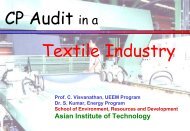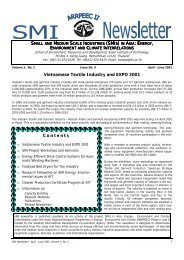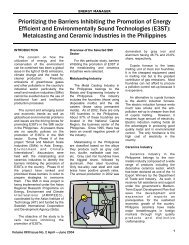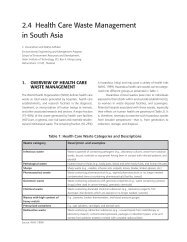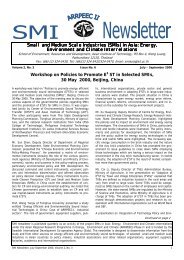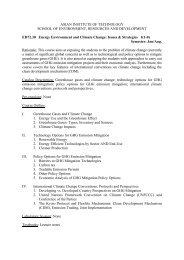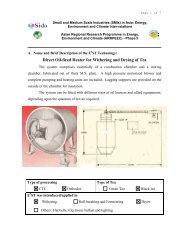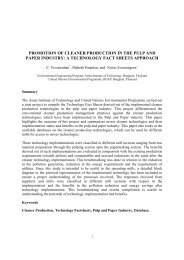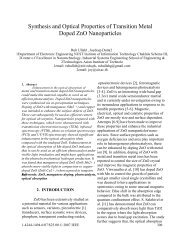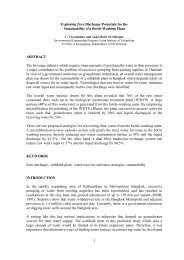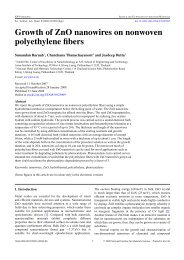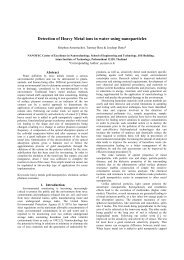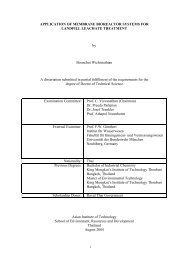A Gap Analysis in Selected Asian Countries, 3R Knowledge Hub ...
A Gap Analysis in Selected Asian Countries, 3R Knowledge Hub ...
A Gap Analysis in Selected Asian Countries, 3R Knowledge Hub ...
You also want an ePaper? Increase the reach of your titles
YUMPU automatically turns print PDFs into web optimized ePapers that Google loves.
66<br />
<strong>3R</strong> <strong>Gap</strong> <strong>Analysis</strong> and F<strong>in</strong>d<strong>in</strong>gs<br />
MSW Composition <strong>in</strong> Japan<br />
Source: www.3rkh.net<br />
URBAN MUNICIPAL WASTE<br />
Over 51 million tons of municipal waste<br />
contributes to the waste stream, at an average<br />
generation rate of nearly 1.14 kg/capita/day.<br />
The waste is segregated <strong>in</strong>to general waste and<br />
recyclable waste and is collected separately.<br />
The collected general waste is sorted as<br />
combustible and bulky. While the combustible<br />
waste is sent directly to waste <strong>in</strong>c<strong>in</strong>erators, the<br />
bulky items are compacted before they are sent<br />
to the waste <strong>in</strong>c<strong>in</strong>erators . At the <strong>in</strong>c<strong>in</strong>erators,<br />
the waste is burnt under controlled conditions<br />
and energy is recovered from the heat<br />
generated. The waste reduced to ash, is then<br />
disposed at a landfill site.<br />
Estimates show that landfill sites <strong>in</strong> Japan will<br />
last only another 12 years with current<br />
municipal waste generation patterns. As a<br />
result, Japan is forced to recover a variety of<br />
materials through kerbside recycl<strong>in</strong>g collection<br />
schemes, recovery of recyclable ferrous metals<br />
from bulky waste items and through electrical<br />
appliance recycl<strong>in</strong>g (where televisions,<br />
refrigerators, wash<strong>in</strong>g mach<strong>in</strong>es and computers<br />
are recovered for recycl<strong>in</strong>g).<br />
Consider<strong>in</strong>g the grow<strong>in</strong>g need to accelerate<br />
recycl<strong>in</strong>g as a means of solv<strong>in</strong>g the waste<br />
management crisis, the Government of Japan<br />
established Eco-Towns <strong>in</strong> 1997.<br />
MSW Disposal <strong>in</strong> Japan<br />
Source: www.3rkh.net<br />
In addition, various laws emphasiz<strong>in</strong>g recycl<strong>in</strong>g<br />
and reuse were enacted. As a result, the actual<br />
amount of waste to landfills has been greatly<br />
reduced after 2000, and Japan was able to<br />
achieve the highest level of resource<br />
productivity.<br />
F<strong>in</strong>d<strong>in</strong>gs<br />
Before the creation of eco-towns and the<br />
enactment of recycl<strong>in</strong>g and reuse oriented laws,<br />
general waste was classified as combustible,<br />
noncombustible, bulky and recyclable and<br />
treated separately. Inc<strong>in</strong>eration and landfills<br />
were the most preferred modes of disposal, thus<br />
creat<strong>in</strong>g problems of grow<strong>in</strong>g shortage of<br />
landfill sites. There has been reduction <strong>in</strong> waste<br />
sent to landfills s<strong>in</strong>ce 1990 due to promotion of<br />
the legislation “Fundamental Law for<br />
Establish<strong>in</strong>g a Sound Material-Cycle Society”.



